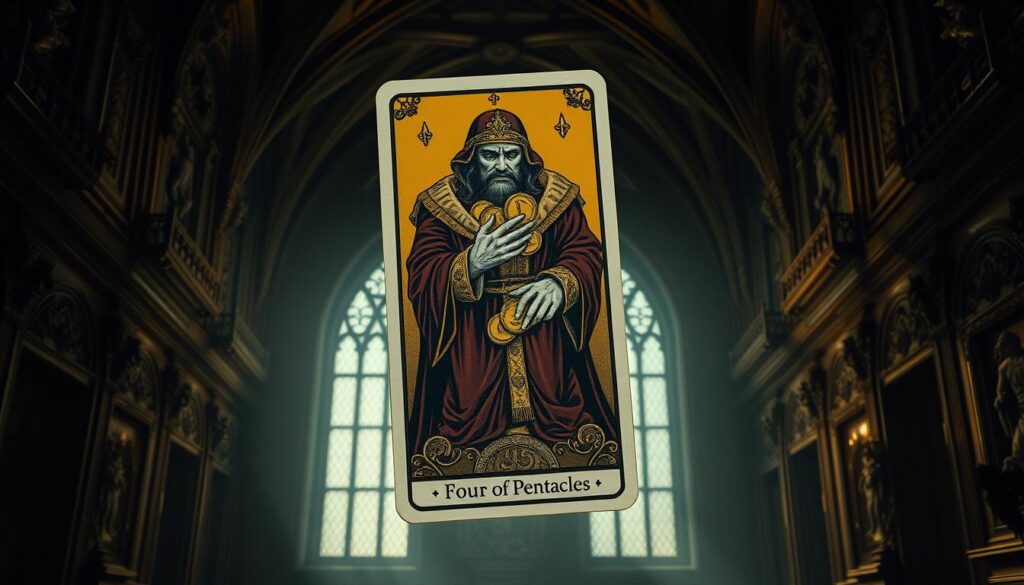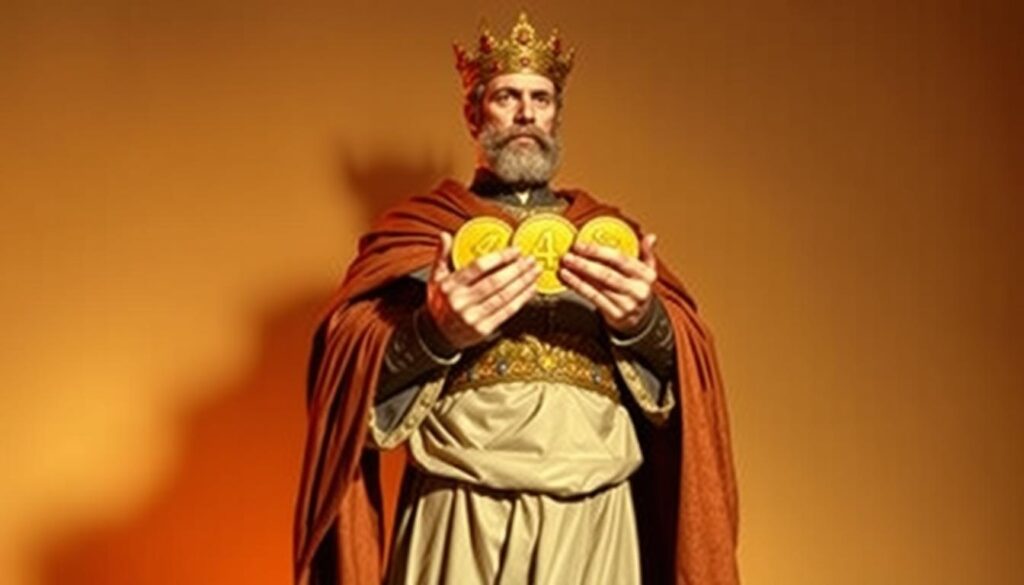Ever felt stuck holding onto things too tightly? The Four of Pentacles in tarot warns against letting fear control your life. This card shows a man gripping his coins, afraid to let go. It’s a powerful symbol of how clinging to material possessions can trap you.
Financial security matters, but not at the cost of joy. The card’s imagery highlights tension—physical comfort versus emotional isolation. Many people today relate to its message, struggling between saving and living freely.
This article explores how to recognize scarcity mindsets. Learn to balance stability with openness. Money alone doesn’t bring freedom—true wealth includes trust and flexibility.
Key Takeaways
- The Four of Pentacles reveals fear-based hoarding behaviors.
- Financial security shouldn’t lead to emotional isolation.
- Modern life amplifies the card’s themes of control and materialism.
- Letting go of scarcity mindsets can improve overall well-being.
- True stability blends practical planning with emotional freedom.
Introduction to the Four of Pentacles
Ever wondered why the Four of Pentacles shows a figure clutching coins so tightly? This minor arcana card reflects deep-seated fears about loss and control. Part of the tarot’s earthy suit, it speaks to how we manage resources—and emotions.

Pentacles symbolize material stability: money, health, and tangible security. Historically, the card’s imagery echoes medieval trade systems, where hoarding wealth meant survival. Modern decks, like Rider-Waite, keep this theme but add layers—like the figure’s rigid posture hinting at emotional isolation.
Boundaries are healthy, but the Four of Pentacles warns when they turn into walls. As one expert notes:
Money works best when it flows.
Holding too tightly can block joy and growth.
Later, we’ll explore its upright and reversed meanings. For now, ask yourself: What’s truly worth holding onto—and what’s worth releasing?
Four of Pentacles Upright Interpretation
When this card appears upright, it carries a dual message. On one hand, it celebrates smart financial choices. On the other, it warns against letting fear dictate your actions. Understanding its layers helps navigate life’s balance between security and freedom.

General Meaning
The upright position highlights stability and careful planning. It’s a nod to those who save wisely or invest for the future. Yet, the card’s grip on coins hints at deeper issues—like resisting change due to anxiety.
Healthy financial boundaries protect without isolating. As one expert puts it:
Wealth is energy – we create what we express.
Unhealthy control, however, stems from scarcity mindsets. It’s the difference between budgeting and hoarding.
Love & Relationships
In relationships, this card signals clinginess. Partners may struggle with trust, fearing loss. Open communication helps soften rigid expectations.
- Positive: Commitment, shared goals
- Challenge: Possessiveness, emotional walls
Career & Finances
Professionally, it reflects job security but also resistance to teamwork. Financially, it praises savings yet questions excessive control over investments.
| Area | Strength | Warning |
|---|---|---|
| Career | Steady income | Stubbornness |
| Money | Smart savings | Risk aversion |
Balance is key—plan for tomorrow without missing today’s opportunities.
Four of Pentacles Reversed Interpretation
Flip the script—what happens when this card appears upside down? The reversed four pentacles signals a shift. It either warns of financial insecurity or celebrates newfound generosity. Unlike its upright position, the reversed meaning dances between extremes.

General Meaning
Upside down, the card’s grip loosens. This can be liberating or chaotic. Two paths emerge:
- Positive: Releasing control, embracing generosity, or adopting a minimalist lifestyle.
- Negative: Reckless spending, gambling, or ignoring healthy financial boundaries.
One tarot reader notes:
Fear of scarcity often fuels both hoarding and impulsivity.
Love & Relationships
In relationships, reversal hints at healing. Clinginess may ease, allowing trust to grow. But if financial insecurity lingers, arguments over money could surface.
Career & Finances
Professionally, the reversed card urges caution. Avoid risky bets—whether job hops or impulsive investments. Instead, focus on adaptable strategies.
| Area | Opportunity | Risk |
|---|---|---|
| Career | Flexibility | Instability |
| Finances | Generous giving | Reckless spending |
Balance remains key. Flow, don’t freeze—or flood.
The Scarcity Mindset and How to Overcome It
Fear of lack can turn smart savers into emotional hoarders. A scarcity mindset tricks us into believing there’s never enough—money, time, or love. Like a financial Catch-22, the tighter we grip, the less we enjoy what we have.

This mindset thrives on fear. It whispers that saving every penny guarantees security, but ignores the cost: missed experiences, strained relationships, and stress. Contrast this with abundance thinking, where trust in life’s flow replaces anxiety.
Shifting Your Perspective
Abundance isn’t about reckless spending. It’s recognizing resources expand when shared. Energy healers note:
Money mirrors energy—stagnation breeds lack, circulation creates plenty.
| Scarcity Mindset | Abundance Mindset |
|---|---|
| Focuses on lack | Focuses on opportunities |
| Hoards resources | Shares strategically |
| Fear-driven decisions | Trust-based actions |
Actionable Steps
- Gratitude journaling: List 3 existing resources daily—money, skills, or support.
- Progressive budgeting: Reduce savings from 85% to 70%, allocating the difference to joy.
- Strategic giving: Donate small amounts to practice releasing control.
Psychologists trace financial anxiety to childhood or trauma. Addressing these roots—through therapy or mindfulness—builds emotional security. Plan for the future, but don’t let it steal today’s peace.
Practical Lessons from the Four of Pentacles
Money should serve you, not control you—what lessons does this card teach? Beyond its imagery of clinging to coins, the Four of Pentacles offers actionable wisdom. It’s a mirror for how we handle resources, emotions, and the balance between them.

Financial Boundaries That Empower
Smart saving starts with structure. Adapt the 50/30/20 rule: 50% for needs, 30% for wants, and 20% for future security. This tarot-inspired twist encourages flexibility—unlike rigid hoarding.
Planning for retirement shouldn’t mean sacrificing joy today. Allocate funds for travel or hobbies within your budget. As one planner notes:
Safe investments grow wealth, but experiences grow your spirit.
- Automate savings: Set up transfers to avoid impulsive spending.
- Review quarterly: Adjust allocations as goals evolve.
Releasing Emotional Detachment
Emotional detachment from possessions is harder than balancing a checkbook. Ask: Does this item spark joy, or fear of loss? Minimalism isn’t about lack—it’s about valuing what truly matters.
Try a “one-in, one-out” rule for purchases. For every new item, donate or sell an old one. This practice builds trust in abundance.
For deeper work, explore budget plans that include therapy or mindfulness. Financial health and emotional freedom go hand in hand.
Conclusion
True wealth isn’t just about numbers in a bank account. The Four of Pentacles reminds us that security and generosity must coexist. Money fuels life, but hoarding it drains joy.
Start small. Monthly financial check-ins keep stability on track. Audit relationships—are they built on trust or control? Add mindful rituals, like pausing before purchases.
As one expert wisely said: “Create what you express.” Plan for the future, but don’t let fear dictate it. The Four of Pentacles isn’t a warning—it’s an invitation to balance.

